|
|
|
Sort Order |
|
|
|
Items / Page
|
|
|
|
|
|
|
| Srl | Item |
| 1 |
ID:
124424


|
|
|
|
|
| Publication |
2013.
|
| Summary/Abstract |
Indigenous peoples are often perceived as custodians of nature owing to their close relationship with their environment and their nature-based livelihoods. This paper investigates the kinds of environmental agencies that are constructed for, and by, indigenous peoples within the United Nations (UN) Permanent Forum on Indigenous Issues (PF) and the Arctic Council. The particular focus of this research is the issue of responsibility. The article brings together empirical materials from the two forums and engages with them using Foucault-inspired approaches. We offer a critical discussion of indigenous peoples' environmental agency in international politics, addressing the need to problematize representations of indigenous agency that to date have been largely unchallenged in both the practice and study of international politics. We identify three perspectives through which the environmental agency of indigenous peoples is validated and justified: having particular knowledge, being stakeholders, and having a close relationship with nature. Certain kinds of expectations are inscribed in each of these perspectives; responsibility becomes intertwined with agency.
|
|
|
|
|
|
|
|
|
|
|
|
|
|
|
|
| 2 |
ID:
123924
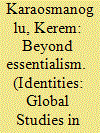

|
|
|
|
|
| Publication |
2013.
|
| Summary/Abstract |
In Turkey, the Alevi cultural 'revival' of the 1990s has been followed by a multifaceted identity-formation process that involves conflicting religio-cultural agendas, intersecting discourses and differing politico-ideological affiliations. Lacking a focus, this process continues to trigger an enriching public debate on Alevi identity, which has been coined an 'enigma' and is considered to be associated with 'ambiguity' and 'ambivalence' by many. What lies beneath the veil of ambiguity has to do with the 'anti-essentialist' transformation of Alevism, which reaches beyond religious, cultural and political orthodoxies. As a result of diverse political loyalties, contestation of discourses on Alevi culture and identity and the equivocal character of the Alevi subject, the Alevis seem to be resisting essentialism. In urban Turkey, an anti-essentialist discourse potentially influencing Alevism, I argue, enables the Alevi self to act with a sense of reflexivity and to search for ways to avoid political, cultural or religious orthodoxies.
|
|
|
|
|
|
|
|
|
|
|
|
|
|
|
|
| 3 |
ID:
114640
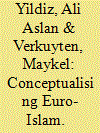

|
|
|
|
|
| Publication |
2012.
|
| Summary/Abstract |
Political, public and academic debates about the need for a 'Euro-Islam' as a necessary condition for the full integration of Muslim are widespread and strong. For Muslims and Muslim organisations in particular, Euro-Islam can be understood as subverting the very nature of their religious identity, making change or reform impossible. This raises the question as to how Muslim organisations reject the idea of the need for a Euro-Islam by construing the core of their faith as not being contradictory with Western values, norms and beliefs. The current study examines this question amongst two major Turkish Muslim organisations (Milli Görüs and Fethullah Gülen) in the Netherlands and Germany. The analysis shows that in managing the demand for reform a distinction was made between Islam as a belief system and Muslims as a group of people, between religion and culture as two types of belief systems and between politics and the true nature of the West.
|
|
|
|
|
|
|
|
|
|
|
|
|
|
|
|
| 4 |
ID:
101473
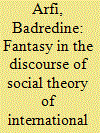

|
|
|
|
|
| Publication |
2010.
|
| Summary/Abstract |
No doubt Wendt's 'Social Theory of International Politics' (STIP) is a discourse. As such, the theory is built on certain discursive conditions of possibility. Drawing on Lacan's theory of discourse, I analyse these conditions of possibility in arguing that a desire of discursive closure is created in STIP through a fantasy. The latter sustains itself not only by pre-empting its own failure but also by maintaining the desire for discursive closure. I argue that STIP cannot escape deploying such a fantasy. More broadly, what social constructivism based on critical realism does, especially in its thin version, is construct a dichotomy between intransitive and transitive objects in its theoretic discourses. It then endeavours, via constructing fantasies, to use transitive discursive objects to sustain the desire for the constructed dichotomies, which hankers for discursive closure. This means that Wendt is more constructivist than he knows, despite his move of 'not going all the way down'. In short, I argue that 'ideas not all the way down' is a discourse all the way down because of what Wendt and thin constructivists struggle to make of it.
|
|
|
|
|
|
|
|
|
|
|
|
|
|
|
|
| 5 |
ID:
114659
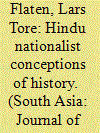

|
|
|
|
|
| Publication |
2012.
|
| Summary/Abstract |
In this article, I seek to examine some key mechanisms underlying the dichotomisation between Hindus and Muslims in Hindu nationalist history writing. Two arguments are central to this study. One is that the strict dichotomisation between Hindus and Muslims presupposes homogeneous categories. This is particularly clear if one examines how Hindu nationalist intellectuals made sense of ambiguities, of individuals and cultural traditions that did not fit directly into the categories, 'Hindus' and 'Muslims'. Moreover, I discuss the role of the so-called hidden 'Others'. I argue that these hidden 'Others' represent, in the form of alternative principles of grouping, the largest obstacle to the Hindu nationalist construction of a Hindu-Muslim dichotomy, both at the political level and within the field of history writing.
|
|
|
|
|
|
|
|
|
|
|
|
|
|
|
|
| 6 |
ID:
152089
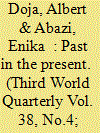

|
|
|
|
|
| Summary/Abstract |
In this article, we explore various forms of travel writing, media reporting, diplomatic record, policy-making, truth claims and expert accounts in which different narrative perspectives on the Balkan wars, both old (1912–1913) and new (1991–1999), have been most evident. We argue that the ways in which these perspectives are rooted in different temporalities and historicisations and have resulted in the construction of commonplace and time-worn representations. In practical terms, we take issue with several patterns of narratives that have led to the sensationalism of media industry and the essentialisation of collective memory. Taken together as a common feature of contemporary policy and analysis in the dominant international opinion, politics and scholarship, these narrative patterns show that historical knowledge is conveyed in ways that make present and represent the accounts of another past, and the ways in which beliefs collectively held by actors in international society are constructed as media events and public hegemonic representations. The aim is to show how certain moments of rupture are historicised, and subsequently used and misused to construct an anachronistic representation of Southeast Europe.
|
|
|
|
|
|
|
|
|
|
|
|
|
|
|
|
|
|
|
|
|